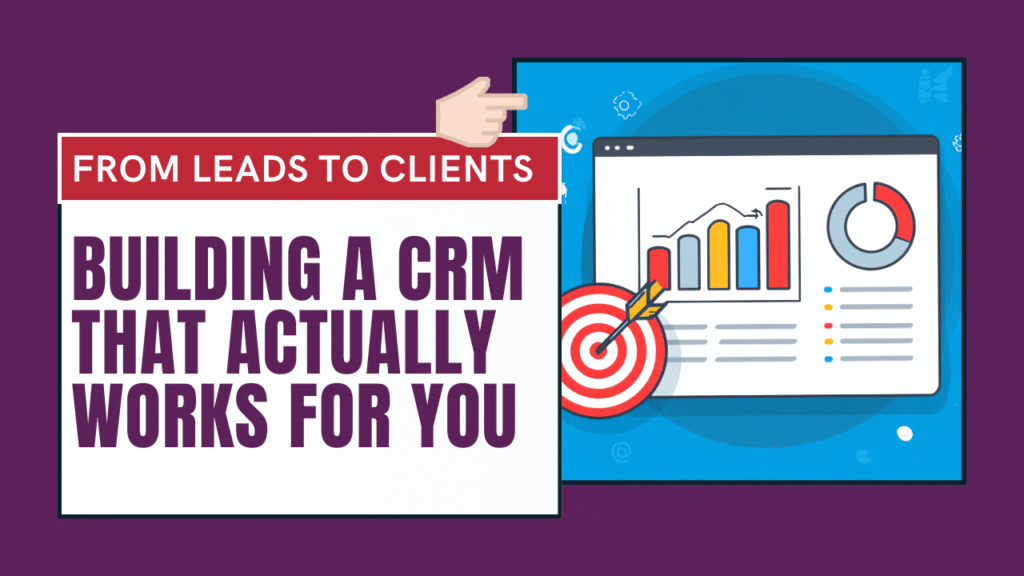
Every business dreams of turning a steady flow of leads into loyal, paying customers. But here’s the truth: without the right system in place, most leads slip through the cracks. That’s where a Customer Relationship Management (CRM) system steps in. When used properly, a CRM doesn’t just store contact details—it becomes the backbone of your sales process, helping you build stronger relationships, close more deals, and grow faster.
In this blog, we’ll explore how to build a CRM that actually works—one that takes leads from first contact all the way to long-term customer loyalty.
Why Traditional CRMs Often Fail
Many businesses invest in a CRM tool but never see results. Why?
- Complex setup: Overloaded with features no one uses.
- Poor adoption: Sales teams avoid it because it feels like extra work.
- Lack of integration: Doesn’t connect with marketing, email, or social media.
- Data overload: Too many fields, too little clarity.
The result? Leads remain stuck in the system instead of moving smoothly through the sales pipeline.
Step 1: Define Your Sales Process Clearly
A CRM is only as strong as the sales process behind it. Before setting up your system, map out:
- Lead capture – How do leads enter your business? (Website forms, ads, referrals, social media).
- Lead qualification – Which leads are worth your time? (Budget, authority, need, timeline).
- Nurturing stage – How will you engage them? (Email campaigns, calls, social follow-ups).
- Conversion stage – What steps close the deal? (Demos, proposals, contracts).
When your CRM mirrors this process, it becomes a natural extension of your sales team.
Step 2: Keep It Simple and User-Friendly
Your CRM should work for your team, not against them. Choose or design one that:
- Has an easy dashboard with clear deal stages.
- Allows quick updates via mobile and desktop.
- Minimizes manual data entry with automation.
- Sends smart reminders to follow up with leads.
A simple CRM increases adoption rates and ensures your sales team actually uses it.
Step 3: Automate What You Can
Automation is the secret sauce of a CRM that works. You can:
- Auto-assign leads to the right sales rep.
- Trigger email sequences when someone fills a form.
- Send reminders for calls or meetings.
- Score leads automatically based on activity (like website visits or email clicks).
By automating repetitive tasks, your sales team focuses on what matters most—building real relationships and closing deals.
Step 4: Integrate Marketing & Sales
Too often, businesses treat marketing and sales as separate silos. A working CRM bridges the gap.
- Syncs with your email campaigns (Mailchimp, HubSpot, etc.).
- Tracks social media interactions.
- Connects with ad campaigns (Google Ads, Meta Ads).
- Provides analytics to see which marketing efforts drive real revenue.
This gives you a 360-degree view of the customer journey. From the first click to the final purchase, nothing gets lost.
Step 5: Track, Measure, Improve
A good CRM isn’t static—it evolves with your business. Use reports and dashboards to track:
- Conversion rates at each stage.
- Average time to close a deal.
- Top performing sales reps.
- ROI from each marketing channel.
By analyzing this data, you’ll see exactly where leads drop off and how to plug those leaks.
Benefits of a CRM That Actually Works
When properly set up, your CRM can:
- Increase lead conversion by up to 30% through consistent follow-ups.
- Save 20+ hours weekly by automating tasks.
- Boost customer retention by keeping communication personal and timely.
- Align sales and marketing, creating a seamless growth engine.
Choosing the Right CRM for Your Business
Not every tool fits every company. For small businesses, lightweight tools like Zoho CRM or Pipedrive may be perfect. For larger teams, Salesforce or HubSpot CRM offer advanced customization.
Key things to consider before choosing:
- Budget vs. features.
- Integration with your current tools.
- Ease of use for your team.
- Scalability as your business grows.
Turning leads into clients isn’t about luck—it’s about process. A CRM that actually works is simple, automated, and aligned with your sales journey. By defining your process, keeping the system user-friendly, integrating marketing, and continuously improving, you’ll build stronger relationships, close more deals, and grow your business faster.
The right CRM isn’t just software—it’s your growth engine.

